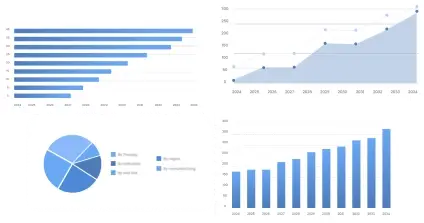
By clicking “Accept All Cookies” you agree to the storing of cookies on your device to enhance site navigation, analyze site usage, and assist in our marketing efforts.
Privacy Policy

The U.S. precision medicine market size surpassed USD 49.81 billion in 2024 and is predicted to reach around USD 235.37 billion by 2034, registering a CAGR of 16.8% from 2025 to 2034.
The U.S. precision medicine market has grown significantly with advancements in genomics, molecular biology, and computational technologies. It holds the promise of revolutionizing healthcare by moving away from a one-size-fits-all approach and towards more tailored and effective interventions. Precision medicine, referred to as personalized medicine, is a cutting-edge approach to healthcare and medical treatment that considers the unique, genetic, environmental, and lifestyle variations of each patient. Rather than taking a one-size-fits-all strategy, precision medicine aims to customize medical care and treatment plans to each patient's specific needs. The integration of AI and big data analytics further fuels the development of personalized treatment plans, ensuring better patient outcomes.
The advancements in genomics are a significant driver of the precision medicine market. The decreasing cost of genome sequencing has made it accessible to a broader population, enabling detailed genetic profiling. This has led to breakthroughs in identifying breakthroughs in identifying biomarkers for various diseases, especially in oncology. Government initiatives like the precision medicine initiative (PMI) in the U.S. further support research and development in this field, accelerating market growth.
The U.S. precision medicine market growth is propelling due to the rising prevalence of chronic diseases, such as cancer, cardiovascular conditions, and diabetes, which has increased the demand for precision medicine. Personalized treatment plans based on Genetic and molecular profiling offer higher efficacy and fewer side effects compared to traditional approaches. For instance, targeted therapies in cancer treatment have shown significant improvements in survival rates and quality of life for patients.
The adoption of companion diagnostics is another factor propelling growth in the U.S. precision medicine market. These diagnostic tools help identify the most effective therapies for individual patients by analyzing their genetics and molecular data. Companion diagnostics play a crucial role in drug development, enabling pharmaceutical companies to design targeted therapies with higher success rates. Additionally, the integration of wearable devices and internet of things (IoT) technologies provides real-time health data and supports precision medicine applications. For example, wearable devices can monitor heart rate, glucose levels, and other vital signs, feeding data into cloud platforms for analysis. This enables healthcare providers to make timely and informed decisions, ensuring proactive care.
Despite its potential, precision medicine faces challenges related to data privacy and security. The collection and storage of sensitive genetic information raise concerns about misuse and unauthorized access. Compliance with regulations like HIPAA AND GDPR requires significant investment in cybersecurity measures, which can be a barrier for smaller organizations. Additionally, the complexity of integrating precision medicine into existing healthcare workflows poses challenges. High costs associated with genetic testing and personalized therapies also limit the accessibility for some patient populations. These high costs serve as barriers to growth in the U.S. precision medicine market.
AI is revolutionizing the precision medicine sector in the United States by accessing advanced data analysis, predictive modeling, and decision-making. Learning algorithms can process vast datasets to identify patterns and correlations that inform personalized treatment plans, and AI-powered tools are also accelerating drug discovery by analyzing genetic and molecular data to identify potential targets. Additionally, AI enhances clinical decision support systems, providing healthcare professionals with actionable insights for patient care. The combination of AI and precision medicine is paving the way for more effective and efficient healthcare solutions.
The future of the U.S. precision medicine market lies in the integration of multi-omics approaches, such as genomics, proteomics, and metabolomics, to gain a comprehensive understanding of disease mechanisms. Advancements in CRISPR and gene-editing technologies offer opportunities for developing novel therapies and preventive strategies. For example, CRISPR is being explored to correct genetic mutations responsible for hereditary diseases, offering the potential for curative treatments. The expansion of telemedicine and digital health platforms also supports the adoption of precision medicine by enabling remote patient monitoring and data sharing. These technologies ensure continuity of care, even in geographically remote areas.
Published by Ajit Bansod
| Subsegment | 2024 | 2025 | 2026 | 2027 | 2028 | 2029 | 2030 | 2031 | 2032 | 2033 | 2034 |
|---|---|---|---|---|---|---|---|---|---|---|---|
| Bioinformatics | - | - | - | - | - | - | - | - | - | - | - |
| Big Data Analytics | - | - | - | - | - | - | - | - | - | - | - |
| Drug Discovery | - | - | - | - | - | - | - | - | - | - | - |
| Gene Sequencing | - | - | - | - | - | - | - | - | - | - | - |
| Companion Diagnostics | - | - | - | - | - | - | - | - | - | - | - |
| Others | - | - | - | - | - | - | - | - | - | - | - |
| Subsegment | 2024 | 2025 | 2026 | 2027 | 2028 | 2029 | 2030 | 2031 | 2032 | 2033 | 2034 |
|---|---|---|---|---|---|---|---|---|---|---|---|
| CNS | - | - | - | - | - | - | - | - | - | - | - |
| Immunology | - | - | - | - | - | - | - | - | - | - | - |
| Oncology | - | - | - | - | - | - | - | - | - | - | - |
| Respiratory | - | - | - | - | - | - | - | - | - | - | - |
| Others | - | - | - | - | - | - | - | - | - | - | - |
| Subsegment | 2024 | 2025 | 2026 | 2027 | 2028 | 2029 | 2030 | 2031 | 2032 | 2033 | 2034 |
|---|---|---|---|---|---|---|---|---|---|---|---|
| Diagnostic Companies | - | - | - | - | - | - | - | - | - | - | - |
| Pharmaceutical Companies | - | - | - | - | - | - | - | - | - | - | - |
| Healthcare IT companies | - | - | - | - | - | - | - | - | - | - | - |
| Others | - | - | - | - | - | - | - | - | - | - | - |
| Subsegment | 2024 | 2025 | 2026 | 2027 | 2028 | 2029 | 2030 | 2031 | 2032 | 2033 | 2034 |
|---|---|---|---|---|---|---|---|---|---|---|---|
| Sequencing by Synthesis | - | - | - | - | - | - | - | - | - | - | - |
| Ion Semiconductor Sequencing | - | - | - | - | - | - | - | - | - | - | - |
| Sequencing by Ligation | - | - | - | - | - | - | - | - | - | - | - |
| Pyrosequencing | - | - | - | - | - | - | - | - | - | - | - |
| Single Molecule Real Time Sequencing | - | - | - | - | - | - | - | - | - | - | - |
| Chain Termination Sequencing | - | - | - | - | - | - | - | - | - | - | - |
| Nanopore Sequencing | - | - | - | - | - | - | - | - | - | - | - |
| Subsegment | 2024 | 2025 | 2026 | 2027 | 2028 | 2029 | 2030 | 2031 | 2032 | 2033 | 2034 |
|---|---|---|---|---|---|---|---|---|---|---|---|
| Consumables | - | - | - | - | - | - | - | - | - | - | - |
| Instruments | - | - | - | - | - | - | - | - | - | - | - |
| Services | - | - | - | - | - | - | - | - | - | - | - |
| Subsegment | 2024 | 2025 | 2026 | 2027 | 2028 | 2029 | 2030 | 2031 | 2032 | 2033 | 2034 |
|---|---|---|---|---|---|---|---|---|---|---|---|
| Oral | - | - | - | - | - | - | - | - | - | - | - |
| Injectable | - | - | - | - | - | - | - | - | - | - | - |
| Subsegment | 2024 | 2025 | 2026 | 2027 | 2028 | 2029 | 2030 | 2031 | 2032 | 2033 | 2034 |
|---|---|---|---|---|---|---|---|---|---|---|---|
| Alectinib | - | - | - | - | - | - | - | - | - | - | - |
| Osimertinib | - | - | - | - | - | - | - | - | - | - | - |
| Mepolizumab | - | - | - | - | - | - | - | - | - | - | - |
| Aripiprazole Lauroxil | - | - | - | - | - | - | - | - | - | - | - |
| Others | - | - | - | - | - | - | - | - | - | - | - |
To get full access to our Market Insights, you need a Professional Account or a Business Suite.

You will receive an email from our Business Development Manager. Please be sure to check your SPAM/JUNK folder too.

You will receive an email from our Business Development Manager. Please be sure to check your SPAM/JUNK folder too.

Our customers work more efficiently and benefit from


